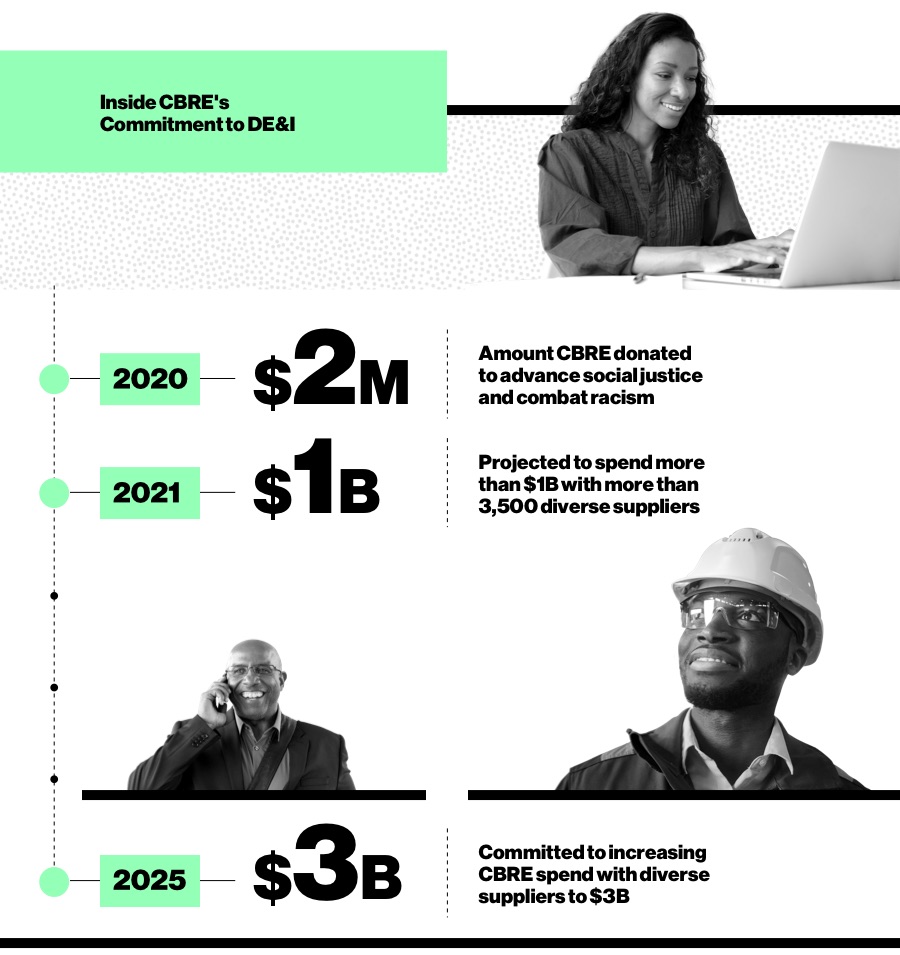How Supplier Diversity Programs Can Support Racial Justice
As the world’s largest commercial real estate services firm, with over 100,000 employees and $24 billion in revenue, CBRE Group recognizes the impact that it has on communities, clients, employees and stakeholders in its more than 500 offices around the world.
In October 2020, shortly after the police killings of George Floyd and Breonna Taylor intensified the spotlight on racial justice and inequality in the United States, CBRE pledged to spend $1 billion with diverse suppliers in 2021 and to grow this to $3 billion in five years. Like many leading companies, the Dallas-based firm understands the ways in which racial injustice can be addressed through supplier diversity programs.
According to the National Minority Supplier Development Council, certified minority-owned businesses generate $400 billion in annual economic output—and $49 billion in annual revenue for local, state and federal tax authorities—that results in the creation or preservation of 2.2 million jobs.
Measuring meaningful impact for DE&I
At CBRE, diverse suppliers currently represent less than 4% of its more than 100,000 global suppliers, and while the company is increasing this number, its primary focus is on the scale of impact that these suppliers can have across CBRE’s supply chain and communities.
“We expect the number of diverse suppliers to grow as we build our pipeline, but the dollar value is more meaningful,” says Tim Dismond, CBRE’s Chief Responsibility Officer. “We’re looking for the economic impact within communities and making sure that diverse suppliers are an integral part of our supply chain process. It’s about their value and impact.”
Meeting diverse suppliers where they are
In certain industries and specialized markets, identifying and attracting qualified diverse suppliers can be a major challenge for procurement teams, according to a 2020 Harvard Business Review study of supplier-diversity programs—but these barriers can be overcome by enterprises committed to inclusion.
“Our philosophy is to meet diverse suppliers where they are and understand and appreciate that,” Dismond says. “Not all of them are going to be ready to do business with us or some of our clients on day one. And when we do this (meet them where they are), it tends to break down barriers and it starts the relationship on a much more positive trajectory.”
To help start these relationships with diverse suppliers, CBRE implemented a free registration portal where any diverse supplier can register their interest in working with CBRE. By offering a free registration portal, CBRE has introduced an equitable tactic for diverse suppliers to connect and share details about their services.
“It’s a way to engage and talk about our story and our commitment,” Dismond says. “We’ve developed an easy-to-use registration system that is free to our diverse suppliers. And this is important because it’s accessed by our buyers when they’re looking to engage diverse suppliers. With our registration system, the diverse suppliers no longer have to figure out a way to get in the door. And they don’t have to have an existing relationship to get on our radar for consideration.”
CBRE is a member of the National Minority Supplier Development Council, the National Veterans Business Development Council, the National Gay and Lesbian Chamber of Commerce, Disability:IN and the Women’s Business Enterprise National Council. With these organizations, CBRE holds diversity fairs and matchmaking sessions that help them identify certified diverse suppliers for their business operations.
In addition to membership in these NGOs, CBRE is also a signatory of CEO Action for Diversity & InclusionTM, a coalition founded in 2017 on a shared belief that diversity, equity and inclusion is a societal issue, not a competitive one, and that collaboration and bold action from the business community—especially CEOs—is vital to driving change at scale. More than 2,000 CEOs have pledged to create a more diverse, inclusive and equitable workforce.

Diverse teams that support supplier diversity
CBRE has been intentional about working on diversity across its business units, and the company recognizes the importance of having a diverse procurement team to drive decisions and value for its supplier diversity strategy. Dismond says that the company has taken several steps to ensure that its procurement teams represent the communities where its employees live and do business. For open positions, the company has diverse slates of prospective candidates as well as diverse interview panels, and recently established a supply chain diversity council that hosted its first diversity and inclusion town hall in the fall of 2021.
Toward building a more diverse workforce, CBRE has implemented two recruitment programs at several Historically Black Colleges and Universities (HBCUs). The first is an HBCU speaker series that features CBRE leaders, ranging from C-suite executives to managers, who share their experiences in the company and the real estate industry, as well as the values that drive their success. The second is HBCU Pathways to Commercial Real Estate, an eight-week internship program targeting HBCU talent, which offers students exposure to different parts of the company such as finance, client solutions and project management.
Leading the commercial real estate industry in diversity
CBRE aims to be a leader in the commercial real estate industry for supplier diversity.
“The commercial real estate industry faces similar DE&I obstacles as other industries,” Dismond says. “As our practices become successful, our hope is that the industry notices and will implement similar measures. We are the largest, we are the leader, but we want to see the similar commitment right across the real estate industry.
“We’re also committed to leading with transparency and accountability, and we report our progress in our annual corporate responsibility report and will continue to do so. I think that transparency and accountability align well with focusing on outcomes and impact. That means you have to measure it and you have to be transparent about it.”
CBRE has seen positive results and benefits from thousands of its diverse suppliers. Two case studies of janitorial services providers represent the impact of the company’s supplier diversity strategy. The first is a minority business enterprise that is a valued member of CBRE’s Global Workplace Solutions Supplier Partner Program. An important supplier to CBRE, this diverse supplier offers an integrated cleaning solution that has consistently received excellent ratings from CBRE and clients. Through a close partnership with CBRE, the supplier has successfully increased their revenue from $20 million to more than $120 million in the last five years.
The second case study is a woman’s business enterprise that is a preferred member of CBRE’s Supplier Partner Program, which is a business commitment to mentor, develop and integrate diverse suppliers into the provisioning of products and services for CBRE or our customers. As part of the program, CBRE manages the company’s performance closely, helps perform root-cause analysis and offers additional opportunities, like the Supplier Quality Development program, to share more about their offerings and services. Additionally, a dedicated CBRE executive sponsor offers insights and manages the top-to-top relationships with prospective clients and helps create opportunities to win additional CBRE business. The supplier also has access to insights into developing technologies and remains at the forefront of program management and deployment. As a result of this close partnership, the supplier has increased their revenue from $7 million to $25 million in the last five years.
“Our global DE&I strategy focuses on outcomes and impact,” Dismond emphasizes. “To drive measurable progress for our supplier diversity efforts, we need to have a global leader that’s organized and equipped to deliver on results. We’re committed to strengthening our relationships with our global counterparts, to engage and align on the global approach. We like what is taking place.”
